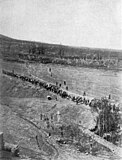Portal:Genocide
The Genocide PortalGenocide is violence that targets individuals because of their membership of a group and aims at the destruction of a people. Raphael Lemkin, who first coined the term, defined genocide as "the destruction of a nation or of an ethnic group" by means such as "the disintegration of [its] political and social institutions, of [its] culture, language, national feelings, religion, and [its] economic existence". During the struggle to ratify the Genocide Convention, powerful countries restricted Lemkin's definition to exclude their own actions from being classified as genocide, ultimately limiting it to any of five "acts committed with intent to destroy, in whole or in part, a national, ethnical, racial or religious group". Genocide has occurred throughout human history, even during prehistoric times, but is particularly likely in situations of imperial expansion and power consolidation. Therefore, it is usually associated with colonial empires and settler colonies, as well as with both world wars and repressive governments in the twentieth century. The colloquial understanding of genocide is heavily influenced by the Holocaust as its archetype and is conceived as innocent victims targeted for their ethnic identity rather than for any political reason. Genocide is widely considered to be the epitome of human evil and often referred to as the "crime of crimes"; consequently, events are often denounced as genocide. (Full article...) Selected article
The Armenian genocide was the systematic destruction of the Armenian people and identity in the Ottoman Empire during World War I. Spearheaded by the ruling Committee of Union and Progress (CUP), it was implemented primarily through the mass murder of around one million Armenians during death marches to the Syrian Desert and the forced Islamization of others, primarily women and children.
Before World War I, Armenians occupied a somewhat protected, but subordinate, place in Ottoman society. Large-scale massacres of Armenians had occurred in the 1890s and 1909. The Ottoman Empire suffered a series of military defeats and territorial losses—especially during the 1912–1913 Balkan Wars—leading to fear among CUP leaders that the Armenians would seek independence. During their invasion of Russian and Persian territory in 1914, Ottoman paramilitaries massacred local Armenians. Ottoman leaders took isolated instances of Armenian resistance as evidence of a widespread rebellion, though no such rebellion existed. Mass deportation was intended to permanently forestall the possibility of Armenian autonomy or independence. On 24 April 1915, the Ottoman authorities arrested and deported hundreds of Armenian intellectuals and leaders from Constantinople. At the orders of Talaat Pasha, an estimated 800,000 to 1.2 million Armenians were sent on death marches to the Syrian Desert in 1915 and 1916. Driven forward by paramilitary escorts, the deportees were deprived of food and water and subjected to robbery, rape, and massacres. In the Syrian Desert, the survivors were dispersed into concentration camps. In 1916, another wave of massacres was ordered, leaving about 200,000 deportees alive by the end of the year. Around 100,000 to 200,000 Armenian women and children were forcibly converted to Islam and integrated into Muslim households. Massacres and ethnic cleansing of Armenian survivors continued through the Turkish War of Independence after World War I, carried out by Turkish nationalists. This genocide put an end to more than two thousand years of Armenian civilization in eastern Anatolia. Together with the mass murder and expulsion of Assyrian/Syriac and Greek Orthodox Christians, it enabled the creation of an ethnonationalist Turkish state, the Republic of Turkey. The Turkish government maintains that the deportation of Armenians was a legitimate action that cannot be described as genocide. As of 2023,[update] 34 countries have recognized the events as genocide, concurring with the academic consensus. (Full article...) Selected biographyIsrael W. Charny (born 1931) is an Israeli psychologist and genocide scholar. He is the editor of two-volume Encyclopedia of Genocide, and executive director of the Institute on the Holocaust and Genocide in Jerusalem. (Full article...) Quote
Related portalsSelected imagesDid you know...
Genocide listsInternational prosecution of genocide (ad hoc tribunals)It is commonly accepted that, at least since World War II, genocide has been illegal under customary international law as a peremptory norm, as well as under conventional international law. Acts of genocide are generally difficult to establish, for prosecution, since intent, demonstrating a chain of accountability, has to be established. International criminal courts and tribunals function primarily because the states involved are incapable or unwilling to prosecute crimes of this magnitude themselves. For more information see: International prosecution of genocide (International Criminal Court)To date all international prosecutions for genocide have been brought in specially convened international tribunals. Since 2002, the International Criminal Court can exercise its jurisdiction if national courts are unwilling or unable to investigate or prosecute genocide, thus being a "court of last resort," leaving the primary responsibility to exercise jurisdiction over alleged criminals to individual states. Due to the United States concerns over the ICC, the United States prefers to continue to use specially convened international tribunals for such investigations and potential prosecutions.[1] For more information see:
Genocide topicsGenocide Article Index
CategoriesThings you can do
Associated WikimediaThe following Wikimedia Foundation sister projects provide more on this subject:
Web resourcesExternal links
Discover Wikipedia using portals |

































